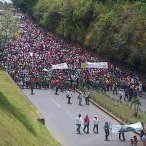English · Español

9 de junio de 2016 | Entrevistas | Anti-neoliberalismo | Derechos humanos | Justicia climática y energía | Luchadores sociales en riesgo | Minga Popular - Colombia 2016
Interview with Claudia Ortiz of the Rios Vivos Movement – Colombia
Descargar: MP3 (3.7 MB)
After ten days of mobilization and resistance in the context of the National Agrarian, Peasant, Ethnic and Popular Minga, in Colombia, 27 departments held activities, there were over 100 demonstrations and approximately 110,000 people participated in blockades and marches.
The first dialogues between the Colombian government and the National Agrarian, Peasant, Ethnic and Popular Summit, organizers of the Minga, took place on Saturday in Cali, in a meeting with the Ministry of Interior Juan Fernando Cristo and 35 delegates of the Summit. Despite these negotiations, Colombian President Juan Manuel Santos said a few days ago that “as a government we have the obligation to enforce the rights of others, and our hands will not shake”, when speaking of the mobilizations and blockades in some roads of the country. Meanwhile, the Interior and Justice Ministries pointed out that the Agrarian Summit and their leaders are divided in the negotiation process, something that was denied by the official spokespeople of the Summit. These leaders have called the Colombian government to stop this disinformation campaign and have said that the “National Agrarian, Peasant, Ethnic and Popular Summit continues united”.
“Today we are facing attacks by the media, with multiple malicious statements by the national government to deligitimize the collective work we´ve been carrying out in the Minga (…) We managed to continue strong in our decision to have a negotiation with mobilizations, where the government responds with the political will required by our demands”, reads a letter published on Wednesday by the Peoples´ Congress, a political and social organization that gathers different sectors of Colombia in the struggle for social justice.
It was also possible to know that the Colombian government´s response has been to advance towards “strategic occupation by military units (…) around the campsites of the mobilized community”, as denounced yesterday by a press released issued by the Association of Indigenous Groups of Norte del Cauca (ACIN). “The fact that a military operation is being planned against the civil population is very delicate, and especially because it took place during the night, when the people are more vulnerable and at risk”, added the ACIN. Also, people have denounced harassment by military and police officers in Antioquia and Huila departments, among others.
Through our correspondent in Colombia, Danilo Urrea, Real World Radio interviewed the leader Claudia Ortíz, member of the Movement in Defense of the Territory and People Affected by Dams Ríos Vivos, who is part of the meetings of the Agrarian Summit. The interview took place while the Political Commission of the Summit met in Santander de Quilichao municipality, Cauca department, with the negotiation representatives: Monsignor Darío Monsalve, Father Francisco de Roux, the United Nations and the Peoples´ Ombudsman.
Negotiation proposals
“The national government has not respected nor provided guarantees for this mobilization and this has been an obstacle for us to advance on our Statement of Demands that we submitted three years ago”, said Ortíz when analyzing the current situation of the establishment of a Negotiation Table. “Economic interests are prioritized over the popular and vulnerable classes of the country”, she added.
Real World Radio has confirmed that the meeting between the negotiation representatives and the Political Commission of the Agrarian Summit took place in order to join efforts for the establishment of a Negotiation Table. About this, Ortíz said that “we are expecting this, since the President was informed about where the communities want the Table established, in addition to the creation of two sub-commissions, one in La María and another in Cali”.
Meanwhile, the Peoples´ Congress added that “we invite the national government to establish the negotiations in Quinamayó, Santander de Quilichao municipality, Cauca, as soon as possible”. “There have been proposals for the creation of two sub-commissions, one in la María Piendamó, Cauca, to discuss the issues more relevant for the indigenous movement, and another in Cali, to deal with other issues of the Statement of Demands. It is very important to highlight that although this is the proposal, there would only be one negotiation at national level”.
Ortiz said that there is “a strategy of disinformation promoted by the ministries to accuse the Summit of being divided, but this is a message to fragment the process itself”.
About the situation denounced in the past days by the Movement in Defense of the Territory and People Affected by Dams Ríos Vivos related to the increasing threats by paramilitary groups against them, the peasant leader said that “we are extremely worried about guarantees”. “If there are no guarantees to protest, how are we going to continue defending the respect for human rights and denouncing how are rights are violated, our rights as people affected by dams, mainly”. “This is one of the issues under discussion here, the building of a National Dam Commission and the creation of an Environmental Commission for Truth. How are we going to really have these spaces for dialogue, when the government has closed all doors to the reasonable demands of communities”, said Ortíz.
Imagen: http://emancipacionobrera.blogspot.com








